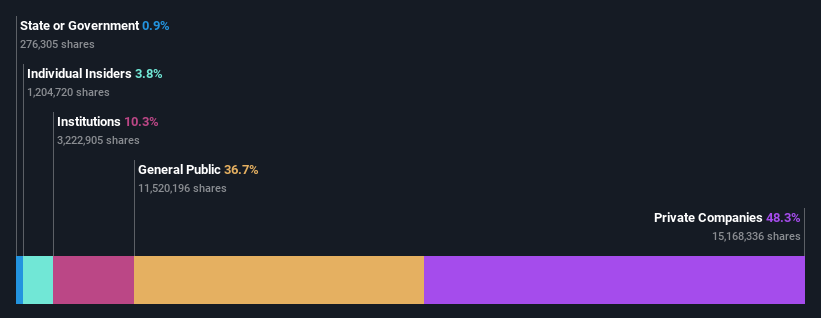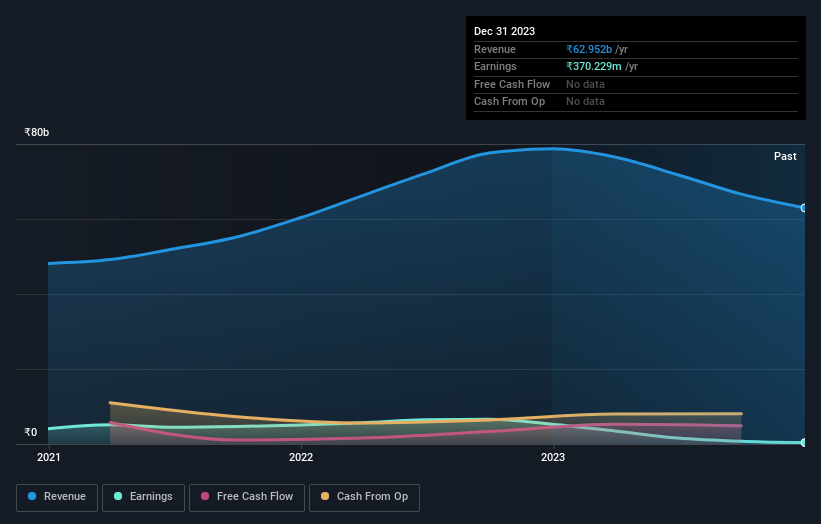Polyplex Corporation Limited's (NSE:POLYPLEX) market cap dropped ₹3.0b last week; Private companies bore the brunt
Key Insights
- Polyplex's significant private companies ownership suggests that the key decisions are influenced by shareholders from the larger public
- 50% of the business is held by the top 5 shareholders
- Institutions own 10% of Polyplex
Every investor in Polyplex Corporation Limited (NSE:POLYPLEX) should be aware of the most powerful shareholder groups. And the group that holds the biggest piece of the pie are private companies with 48% ownership. In other words, the group stands to gain the most (or lose the most) from their investment into the company.
And last week, private companies endured the biggest losses as the stock fell by 11%.
In the chart below, we zoom in on the different ownership groups of Polyplex.
Check out our latest analysis for Polyplex

What Does The Institutional Ownership Tell Us About Polyplex?
Institutional investors commonly compare their own returns to the returns of a commonly followed index. So they generally do consider buying larger companies that are included in the relevant benchmark index.
We can see that Polyplex does have institutional investors; and they hold a good portion of the company's stock. This implies the analysts working for those institutions have looked at the stock and they like it. But just like anyone else, they could be wrong. It is not uncommon to see a big share price drop if two large institutional investors try to sell out of a stock at the same time. So it is worth checking the past earnings trajectory of Polyplex, (below). Of course, keep in mind that there are other factors to consider, too.

Hedge funds don't have many shares in Polyplex. The company's largest shareholder is Agp Holdco Limited, with ownership of 24%. Secure Investments Limited is the second largest shareholder owning 18% of common stock, and Utkarsh Trading and Holdings Limited holds about 4.5% of the company stock.
On looking further, we found that 50% of the shares are owned by the top 5 shareholders. In other words, these shareholders have a meaningful say in the decisions of the company.
While studying institutional ownership for a company can add value to your research, it is also a good practice to research analyst recommendations to get a deeper understand of a stock's expected performance. Our information suggests that there isn't any analyst coverage of the stock, so it is probably little known.
Insider Ownership Of Polyplex
The definition of company insiders can be subjective and does vary between jurisdictions. Our data reflects individual insiders, capturing board members at the very least. Company management run the business, but the CEO will answer to the board, even if he or she is a member of it.
Most consider insider ownership a positive because it can indicate the board is well aligned with other shareholders. However, on some occasions too much power is concentrated within this group.
We can see that insiders own shares in Polyplex Corporation Limited. As individuals, the insiders collectively own ₹931m worth of the ₹24b company. Some would say this shows alignment of interests between shareholders and the board. But it might be worth checking if those insiders have been selling.
General Public Ownership
The general public, who are usually individual investors, hold a 37% stake in Polyplex. While this size of ownership may not be enough to sway a policy decision in their favour, they can still make a collective impact on company policies.
Private Company Ownership
Our data indicates that Private Companies hold 48%, of the company's shares. Private companies may be related parties. Sometimes insiders have an interest in a public company through a holding in a private company, rather than in their own capacity as an individual. While it's hard to draw any broad stroke conclusions, it is worth noting as an area for further research.
Next Steps:
It's always worth thinking about the different groups who own shares in a company. But to understand Polyplex better, we need to consider many other factors. Like risks, for instance. Every company has them, and we've spotted 3 warning signs for Polyplex (of which 1 is concerning!) you should know about.
Of course this may not be the best stock to buy. So take a peek at this free free list of interesting companies.
NB: Figures in this article are calculated using data from the last twelve months, which refer to the 12-month period ending on the last date of the month the financial statement is dated. This may not be consistent with full year annual report figures.
New: Manage All Your Stock Portfolios in One Place
We've created the ultimate portfolio companion for stock investors, and it's free.
• Connect an unlimited number of Portfolios and see your total in one currency
• Be alerted to new Warning Signs or Risks via email or mobile
• Track the Fair Value of your stocks
Have feedback on this article? Concerned about the content? Get in touch with us directly. Alternatively, email editorial-team (at) simplywallst.com.
This article by Simply Wall St is general in nature. We provide commentary based on historical data and analyst forecasts only using an unbiased methodology and our articles are not intended to be financial advice. It does not constitute a recommendation to buy or sell any stock, and does not take account of your objectives, or your financial situation. We aim to bring you long-term focused analysis driven by fundamental data. Note that our analysis may not factor in the latest price-sensitive company announcements or qualitative material. Simply Wall St has no position in any stocks mentioned.
About NSEI:POLYPLEX
Polyplex
Engages in the manufacture and sale of polymeric films in India, other Asian countries, Europe, the Americas, and internationally.
Flawless balance sheet with proven track record and pays a dividend.
Similar Companies
Market Insights
Community Narratives



